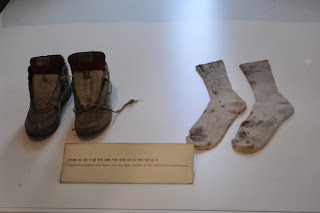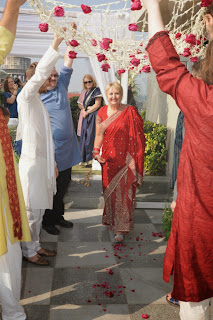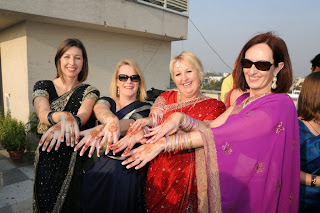Welcome to my blog: this is the story of our adventures in India: the wonderful, the strange, the downright bizzare & the not-so-nice. So sit back & enjoy the ride as we take you on a journey across the sub-continent (& everywhere in-between).
Saturday, November 30, 2013
A bit of Movember action at the High Commission
Every
year, the Social Committee runs a Movember fund raiser where men grow a mo to
support men’s health issues.
On Friday
night, the Henry Lawson Club hosted a Mr Movember parade where we chose the
best mo of the year.
Here
are some photos from the evening:
 |
| And the winner of Mr Movember 2013 is....Alex !! |
Thursday, November 28, 2013
The caste system in India
Now here’s a topic that you could spend hours on.
This post is not meant to be a definitive account
about the caste system – there are many more people who have devoted their
lives to studying this subject.
I’m just trying to give you a brief overview.
Basically, the caste system is broken down into four
main groups:
Brahmins
Are those engaged in
scriptural education and teaching, essential for the continuation of knowledge
(ie: priests,
teachers, and judges)
Kshatriya
Are those engaged in all forms
of public service, including administration, maintenance of law and order and
defense (mainly known as the warrior caste)
Vaishya
Are those engaged in
commercial activity (ie: businessmen, skilled farmers and merchants)
Shudra
Semi
or unskilled workers
There is one more caste known as the untouchables
(referred to by Gandhi as the Harijan, or "Children of God."). Today, they are known as the Dalit, a term
that can be translated as “oppressed.”
The Dalit
are those that perform the most menial of labour.
The census of 2001 showed that the proportion of Dalit
population was 16.2% of India's total population at that time.
There is extremely limited mobility and interaction between
castes.
Members of a caste are regulated as to who they interact
with and can only marry members of their own caste.
The designation of caste overshadows any and all
religious distinctions and is a powerful influence in a Hindu’s life.
According to Hindu doctrine, the only way to change
castes is to be reborn into a new caste after death as a result of good or bad
karma from you previous life.
Thus ends the (very) brief lesson
on the caste system.
Wednesday, November 27, 2013
A visit to Gandhi Smitri and Indira Gandhi Memorial
The other day, I visited Gandhi Smitri and Indira Gandhi
Memorial here in Delhi. Both are memorials to Mahatma Gandhi and Indira Gandhi.
It is also where both leaders were assassinated.
Gandhi Smitri
Mahatma Gandhi was assassinated on 30 January 1948, on
the grounds of what is now called Gandhi Smitri.
He was walking to a prayer meeting when an assassin
pulled a gun and shot Gandhi at point-blank range.
He died on the spot.
The grounds have now been transformed into a memorial of
his life. The path he walked to his assassination is marked by stone footsteps.
I found the place quite tranquil yet sad.
Why
was he assassinated ?? He was killed by a Hindu radical who saw the creation of
Pakistan during Partition as a sell-out and a weakening of India.
The partition
enforced by the British in 1947 resulted in one of the largest mass migrations
in human history and sectarian killings on an unprecedented scale.
Even
before Partition, the violent reaction against it generated immense tensions.
The
thing was, Gandhi was against the creation of Pakistan on sectarian grounds. He
probably could see what was going to happen.
 |
| The path Gandhi took to his death |
 |
| The spot where Gandhi was assassinated |
 |
| Gandhi's worldly possessions |
 |
| His famous glasses |
Indira Gandhi Memorial
Indira Gandhi was assassinated on 31 October 1984 on the
grounds of her house as she walked to an interview with Peter Ustinov.
As she approached a guard post, two of her Sikh
bodyguards (one being her favourite who she’d known for 10 yrs) opened fire –
one emptying his entire magazine into her body.
Her assassination was in retaliation to Operation “Blue
Star” – the Indian Army’s assault on and damage to the golden Temple in
Amritsar, one of the most sacred sites for the Sikh religion.
Both assassins made no attempt to run and gave themselves
up immediately.
Both were taken away and within minutes, one was killed “while
trying to escape”.
Why her Sikh bodyguards were allowed to stay on and guard
her has never been adequately explained.
An enquiry into the assassination (the Thakkar Inquiry)
pointed its suspicions towards the personal secretary to Mrs. Gandhi (Rajinder Dhawan).
He had overruled the concerns of intelligence and security officials who wanted
the removal of Sikh policemen in her security detail.
As a result of the assassination, anti-Sikh rioting broke
out which resulted in over 8,000 deaths.
It is thought that the acts of violence were organized
with support from Delhi police officials and the central government headed by
Indira Gandhi’s son, Rajiv.
Rajiv was made Prime Minister soon after the assassination.
 |
| The sari Indira Gandhi was wearing when she was assassinated |
 |
| Indira Gandhi walked down this path towards the guard post in the distance... |
 |
| ...and was assassinated at the spot where the clear glass is |
Rajiv Gandhi memorial
The grounds also contain a memorial to Rajiv Ghandi’s
life.
He was assassinated in 1991, in the southern of Tamil
Nadu while campaigning for an upcoming election.
He arrived at a political rally where he was due to give
a speech. As he made his way the dais, people placed floral wreaths around his.
His assassin, a woman, approached him, greeted him, bent
down to touch his feet and then detonated an explosive vest she had hidden under
her sari.
His assassin was a female LTTE suicide bomber.
The LTTE was a Sri Lankan separatist organization fighting
for an independent Tamil homeland. They were also known as the “Tamil Tigers”. They
were wiped out when the Sri Lankan Civil war ended in 2009.
 |
| The remains of the clothes Rajiv Gandhi wore on the day of his assassination |
Monday, November 25, 2013
A great day for a wedding
So
you’re in India with your partner, you’ve had such a great time here and you
decide what would really make the trip is if you got married – Indian style !!
That’s
what happened yesterday: Jennie’s aunt and uncle decided they’d get married
Indian style with the works – saris, kurtas, a band and an elephant.
It
was a lovely day for a wedding.
As
with any wedding, it was running a bit late – courtesy of the elephant !!
Hope
you like the photos:
 |
| Classy !! |
 |
| The Bride |
 |
| Waiting for the elephant |
 |
| The elephant: 1&1/4 hrs late !! |
 |
| The band |
 |
| The groom and best man |
 |
| CJ: Master of ceremonies |
 |
| Another ride of the elephant |
 |
| Don't ask !! |
Subscribe to:
Comments (Atom)




































































